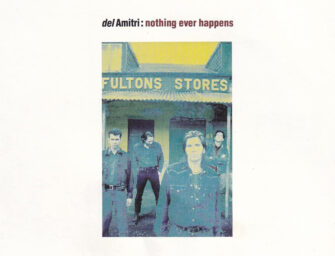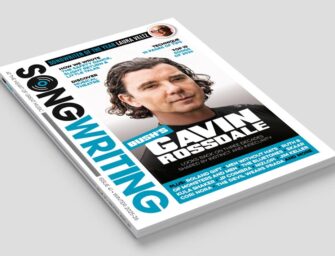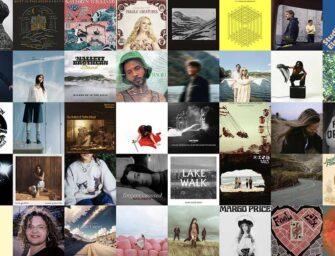
SATCH: “I think that’s the secret of songwriting… vulnerability.”
The London-based songwriter speaks about the research that influenced his debut album and the power of vulnerability in lyric writing
Joshua ‘SATCH’ Satchell is a London-based songwriter, who released his debut album, Present In The Post, last October. An empowering album that shares SATCH’s journey of transition, it showcases his natural talent for crafting songs that contain intricate rhyme schemes and near rhymes.
When he’s not working on his work as an artist, SATCH is often collaborating with other songwriters and artists, encouraging them to use lyrics as a way to express themselves authentically, thus connecting on a deeper level with their listeners. Furthermore, he teaches the craft of songwriting to both undergraduate and graduate students at BIMM London.
Speaking with Songwriting Magazine, SATCH opens up about his research on songwriting and vulnerability, how he helps others tell their stories through songwriting, and the important difference between writing and releasing music.
How has the research you completed for your masters degree influenced your work as a songwriter?
“I researched how sharing our stories in songwriting through vulnerability and authenticity breaks down barriers of prejudice. That culminated in my debut album, which came out in October called Present In The Post, which is an autobiographical, retrospective, maybe ongoing exploration of transition. It explores all different areas like religion, dating, family, all kinds of stuff.
“Whilst I was making that record, I made my own podcast. I was getting responses from queer people and non-queer people reaching out for various reasons, because they’ve learned something or they wanted to ask something or because they felt a connection. It just all came back to this vulnerability and authenticity. So then I applied that to songwriting.
“I was doing experiments. I was playing vulnerable songs and what I consider to be less vulnerable songs live at shows and festivals. Then I would talk to people afterwards and it was always the most vulnerable ones that resonated the most. So I tried to implement that in my album and in all my writing now, whether that’s for myself, or writing for other people. Really, I think that’s the secret of songwriting… vulnerability.”
Present In The Post, is described as “autobiographical”. What was the process like crafting such a personal collection of songs?
“It was a long one because it started pre-pandemic, and continued throughout. I write a lot now, but that was a really slow one. Sometimes I had to leave songs for a while and come back to them. It usually starts, if it’s a personal song, with me writing some lyrics on my phone on a train – healing, feeling, romanticised somehow. Then, bringing that back and either fleshing out on the piano or guitar in my studio or taking it to someone else. Then, I’ll take it to a producer after that.”

SATCH: “To write about transition felt like less-charted waters, and became a privilege rather than a cross to bear.”
You often collaborated with William Nash, who you were previously in a group with. What do you think makes you all good cowriters?
“I met Will in the second year of uni. It was the end of term party and he came up to me and asked me if I would like to collaborate and we’re still collaborating now. I don’t really know what makes it work. On paper, we really have nothing in common! But I think maybe one of the things is a kind of strengths and weaknesses. I’m primarily a lyricist. He’s a multi-instrumentalist. That works well together.
“I just finished having a writing session with someone else and we were talking about how, maybe the reason it works for us when we’re writing for other people, is that we know how to have fun in the room. A fun time can lead to getting a serious product out of it.”
How does work as an artist differ from your work as a staff songwriter for other artists?
“I don’t think it’s as different as people would imagine and maybe that’s why it works. For me, it comes back to vulnerability again. When I’m in a room with someone, I’m not just asking them to be vulnerable and I’m hiding away. I’m going to tell them some vulnerable stuff to make them feel comfortable to be vulnerable with me. Sometimes the sessions I’m in are as short as two and a half hours, and we’ve not met before. So I’ve got to make someone feel comfortable to get them to share their story with me, or at least be comfortable with the uncomfortable.”
I think what I’m hearing is once you have that vulnerability, then the vulnerability kind of equals connection, and then the connection equals being able to work as a team…
“Yeah, “connection” is the key word. I think all songwriters want people to relate to our songs. We usually start somewhere because we’ve heard a record growing up and it is someone who has articulated our pain in a way that we couldn’t do ourselves. We felt less alone in the world when we felt that connection. Now we want to try and do that for other people. The only way we do that is through vulnerability. It’s like we’re reaching out and sonically holding someone’s hand for three-and-a-half minutes.”
Who was that person for you?
“There’s so many… Kae Tempest does that. I’ve got a song on my album called Hold Your Own. They were writing about gender and other stuff in a way that I hadn’t heard anyone else do before. Seeing that representation was life-changing.”
Has your mission and aim to connect with marginalised communities through music given you any challenges?
“I think this is part of why it took me such a long time to write the album; I definitely remember feeling like we, as songwriters, often hear how other people have written about subjects and then we borrow ideas from those songs to inspire our own writing. There’s nothing that anyone can do that is completely original. Then, I realised that great songwriting is saying something that’s been said a million times before in a new way, or saying something new. How many songwriters actually get to write about something new? Not that many.
“To write about transition felt like less charted waters, and became a privilege rather than a cross to bear. So, once I made that shift that hugely helped. Also, discerning between writing and releasing music, and not letting releasing infiltrate writing was really impactful on my creative process. There would be certain lines that I would write, that would automatically make me worry about certain people’s reactions. Eventually, I realised that if you feel that someone is potentially going to be upset by a line, it’s probably because it’s vulnerable, and therefore, it probably is the line that you need to say.”

SATCH: “Great songwriting is saying something that’s been said a million times before in a new way, or saying something new.”
Do you think that’s the double-edged sword of being in this digital era where we can release stuff and connect with more people, but also we fear the judgment because it is going out to such a wide audience?
“That’s what I’m saying. I think you need to discern between the two. There’s writing a song and there’s releasing a song. If you want to be authentic in your writing, you need to write something because it’s what you need to write, not because you think it’s what other people want to hear.
“You’ve got to train your brain. Maybe not all songs are meant to be released. Maybe, some are just meant to be written and written in the way they need to be. Then we maybe release them later. Also, good songs are written and great songs are rewritten. So, by not thinking about all that perfect stuff at the start, that’s what’s going to allow you to come up with the material you need that you can then mould into something beautiful later.”
Also being based in London, can you speak about some unique aspects of the songwriting community compared to the other places you have collaborated in?
“I have the most experience in London, so I’m not sure it’s a fair comparison! In places like Nashville and Rotterdam for example, it’s really interesting to see how things are different. I think in Nashville, there’s this real understanding that the song is the core. It’s the lyrics. It’s the melody. Then we build everything around that. In London, sometimes it feels like the focus is more on the record than the song.”
London’s also way more international. So you’re going to have people that have different backgrounds and songwriting experiences…
“Which we’re so much better off for! And it’s not just about the city that you’re in, but also the genre that you’re writing for, and the creative intention – whether it’s for pitch, whether the artist is in the room, whatever the scenario is, that’s going to affect the process. I’ve been on camps where people will just play a track and then they’ll jump up and they’ll make vocal noises and then we’ll try and fit some words to that. That is a very different set of skills and a very different experience to being in a room with someone and them literally crying while we try to articulate their story in words first.”
Looking ahead, what are you working on right now? What are you working on in the future? And what are your aspirations in terms of a songwriter/ artist?
“I just did ‘Songuary’ where I wrote a song every day in January so I’m going to release a bunch of singles this year. I’m going to keep writing with other people, on camps and with artists having sessions. I’m going to play my live show through the summer at festivals and Pride festivals as well. Hopefully, I’ll go out to Nashville again.
“I’m just going to let creativity lead the way, but if I think about what I want to be able to say I’ve done at the end of this year, I want to say that I’ve written some songs that connect with people. So I’m just going to try and do that however I can!”
































Related Articles